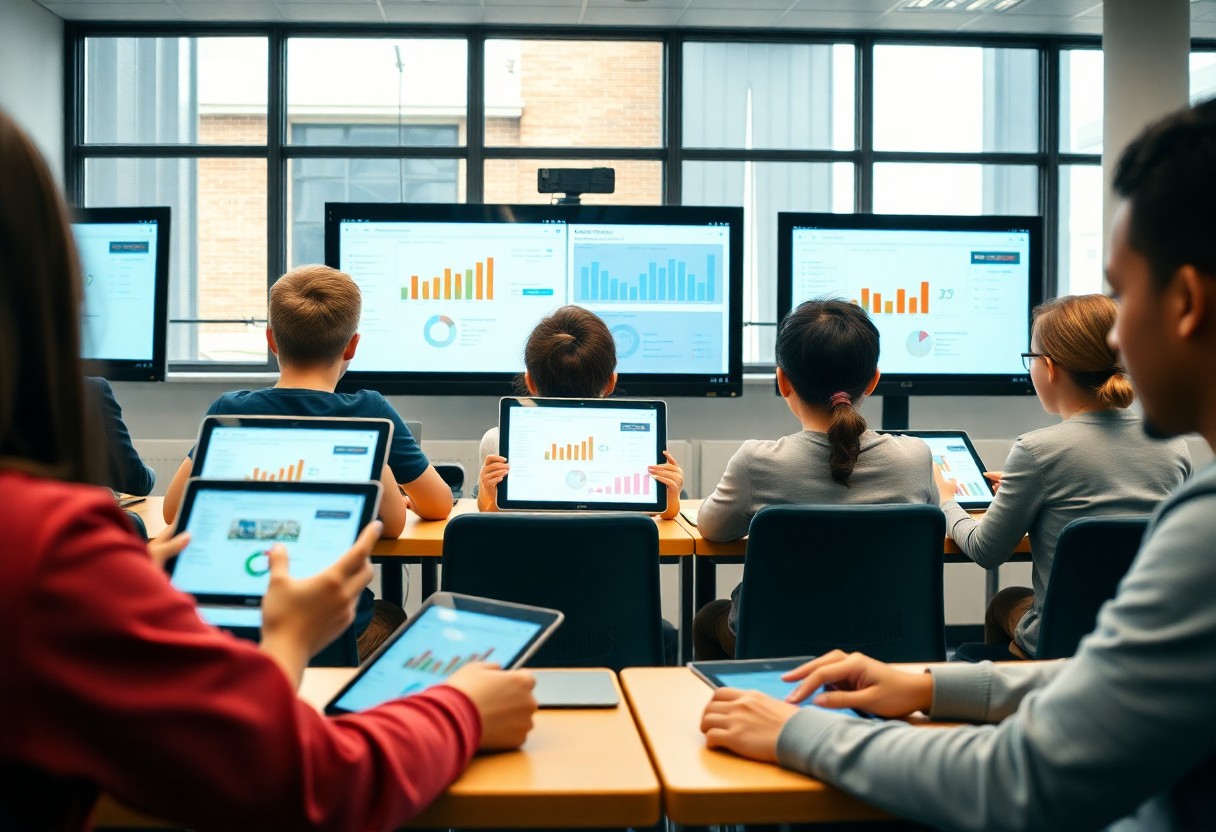Education enters a new era with the integration of machine learning algorithms in crafting personalized lesson plans. This revolutionary approach allows educators to tailor teaching strategies based on individual student needs, boosting engagement and knowledge retention. By analyzing data patterns and performance metrics, machine learning can adapt lesson content, pacing, and delivery methods to optimize learning outcomes. Dive into the world where technology and education converge to revolutionize the way we learn.
The Current State of Education
Limitations of Traditional Teaching Methods
To truly understand the impact of machine learning algorithms on personalized lesson plans, one must first recognize the limitations of traditional teaching methods. Your typical classroom setting often employs a one-size-fits-all approach, where every student is expected to learn at the same pace and in the same manner. This approach fails to account for the diverse learning styles and capabilities of individual students, leading to gaps in understanding and engagement.
The Need for Personalization
To bridge these gaps and cater to the unique needs of each student, there is a growing recognition in education of the need for personalized learning experiences. By leveraging machine learning algorithms, educators can analyze vast amounts of data on student performance, preferences, and behavior to create tailored lesson plans that optimize learning outcomes. This individualized approach can help students stay engaged, motivated, and ultimately achieve greater academic success.
What are Machine Learning Algorithms?
Definition and Types of Machine Learning
The field of machine learning involves training algorithms to learn patterns from data and make decisions or predictions without being explicitly programmed. There are three main types of machine learning algorithms:
- Supervised Learning: Algorithms learn from labeled data to make predictions or classifications.
- Unsupervised Learning: Algorithms find patterns in unlabeled data, like clustering or association.
- Reinforcement Learning: Algorithms learn to make sequences of decisions to maximize rewards.
- Deep Learning: An advanced form of machine learning using neural networks and multiple layers to learn intricate patterns.
- Self-supervised Learning: Algorithms use the structure of the input data to generate labels for training itself.
The applications of machine learning are vast and growing rapidly. They are used in industries such as healthcare, finance, marketing, e-commerce, and more. Machine learning algorithms are transforming how businesses operate and make decisions. The ability to analyze large datasets quickly and accurately makes machine learning a valuable tool in today’s data-driven world. The potential for automation and prediction is vast with machine learning algorithms. The power of machine learning lies in its ability to continuously learn and improve predictions over time.
Applications in Various Industries
Machine learning algorithms have found numerous applications in various industries, such as:
For instance, in healthcare, machine learning is used for diagnosis and treatment recommendations. In finance, it helps with fraud detection and algorithmic trading. In marketing, machine learning is utilized for customer segmentation and personalized recommendations. The potential for innovation and efficiency gains in various sectors due to machine learning is immense, revolutionizing how businesses operate and interact with customers.
How Machine Learning Can Enhance Personalized Lesson Plans
Identifying Student Strengths and Weaknesses
On a traditional classroom scale, it can be challenging for educators to pinpoint each student’s unique strengths and weaknesses accurately. However, with the utilization of machine learning algorithms, a significant shift towards personalized lesson plans is possible. Machine learning algorithms can analyze vast amounts of data from student interactions with educational material, identifying patterns and trends that may go unnoticed by human teachers. By recognizing these patterns, educators can tailor lesson plans to focus on areas where individual students need the most help while also enhancing their strengths.
Adaptive Assessments and Real-time Feedback
Personalized lesson plans become even more effective when paired with adaptive assessments and real-time feedback. Machine learning algorithms can facilitate this process by continuously assessing student performance and providing instant feedback based on their responses. This real-time feedback allows students to track their progress immediately and adjust their learning strategies accordingly. Educators can also use this data to modify lesson plans in real time, ensuring that each student receives the support they need to succeed.
Personalized assessments catered to individual students have been shown to increase engagement, motivation, and ultimately improve learning outcomes. With machine learning algorithms, educators can offer a more dynamic and interactive learning experience that adapts to each student’s unique learning style and pace.

Benefits of Machine Learning in Education
Improved Student Outcomes and Engagement
All educators aim for their students to achieve success, and machine learning algorithms can significantly contribute to this goal. By analyzing vast amounts of data on student learning patterns and behaviors, personalized lesson plans can be created to cater to individual student needs. This tailored approach ensures that each student receives the support and challenges they require, leading to improved academic outcomes and enhanced engagement in the learning process.
Enhanced Teacher Efficiency and Productivity
For teachers, machine learning algorithms can be a game-changer in terms of efficiency and productivity. By automating time-consuming tasks such as grading assessments, compiling progress reports, and identifying areas where students may be struggling, teachers can focus their time and energy on crafting dynamic lessons and providing individualized support to their students.
Improved efficiency means that teachers can allocate more time to interacting with students and fostering a positive learning environment. Additionally, machine learning algorithms can offer insights into teaching strategies that are most effective for different student profiles, further enhancing teacher engagement and impact in the classroom.
Machine Learning Models for Personalized Learning
Collaborative Filtering and Knowledge Tracing
Not all students learn at the same pace or in the same way, making it crucial for educators to tailor lesson plans to individual needs. Collaborative filtering algorithms analyze user behavior and preferences to recommend items of interest. In the education sector, this technique can be applied to suggest personalized learning materials tailored to each student’s strengths and weaknesses. Knowledge tracing models, on the other hand, track a student’s progress through a course by identifying concepts they have mastered and those that require additional practice. By leveraging these machine learning algorithms, educators can create customized lesson plans that cater to the unique learning abilities of each student.
Natural Language Processing and Sentiment Analysis
Models based on natural language processing and sentiment analysis are revolutionizing the way educators gauge student engagement and comprehension. Natural language processing algorithms allow educators to process and analyze large amounts of text data, such as essays or assignments, to gain insights into student performance and comprehension levels. Sentiment analysis empowers educators to understand how students feel about specific topics or assignments, enabling them to adjust lesson plans accordingly. By incorporating these advanced machine learning techniques, educators can create more personalized and effective learning experiences.
Learning from student interactions and feedback is imperative for educators to continuously improve their teaching methods. By leveraging machine learning models like natural language processing and sentiment analysis, educators can gain valuable insights into student comprehension, engagement, and preferences. These tools enable educators to create data-driven, personalized lesson plans that cater to the specific needs of each student, ultimately leading to a more effective and engaging educational experience.
Data Collection and Analysis in Education
Sources of Educational Data
Educational data can be gathered from various sources such as student assessments, attendance records, learning management systems, and even social and emotional data. These sources provide valuable insights into student performance, engagement levels, and behavior patterns. By analyzing this data, educators can tailor their lesson plans to address the specific needs of each student.
Data Mining and Pattern Recognition Techniques
Collection of educational data has become more accessible with the advancement of technology. Data mining and pattern recognition techniques play a crucial role in extracting meaningful information from large datasets. These techniques enable educators to identify patterns, trends, and correlations that would be impossible to discern through traditional methods. By utilizing machine learning algorithms, educators can predict student outcomes, recommend personalized learning paths, and provide timely interventions to support student success.
With data mining and pattern recognition techniques, educators can unlock the power of big data in education. These techniques empower teachers to make data-driven decisions and create personalized learning experiences that cater to the individual needs of each student. By leveraging machine learning algorithms, educators can revolutionize traditional teaching methods and pave the way for a more inclusive and effective educational system.
Implementing Machine Learning in Educational Institutions
Integrating Machine Learning with Existing Systems
Unlike traditional teaching methods, machine learning algorithms have the potential to revolutionize educational institutions by personalizing lesson plans for each student. An important step in implementing machine learning in educational settings is integrating these algorithms with existing systems. By seamlessly merging machine learning technology with current educational platforms, institutions can harness the power of data analytics to tailor lesson plans to individual student needs.
Addressing Privacy and Security Concerns
Machine learning in education raises valid privacy and security concerns that must be addressed before widespread adoption. Institutions must ensure that student data is secure and protected from breaches. Additionally, strict protocols need to be in place to safeguard sensitive information and prevent unauthorized access.
For instance, implementing encryption techniques and access controls can help mitigate risks associated with data privacy. It is imperative for educational institutions to prioritize cybersecurity measures and adhere to compliance regulations to build trust with students, parents, and regulatory bodies.
Teacher Training and Support
Upskilling Teachers for Machine Learning Integration
Training teachers in the implementation of machine learning algorithms is crucial for the successful integration of personalized lesson plans in education. It is important to provide educators with the necessary knowledge and skills to confidently use technology tools to tailor lessons to individual student needs. Workshops, online courses, and mentorship programs can play a significant role in upskilling teachers and helping them leverage the power of machine learning in the classroom.
Ongoing Professional Development and Resources
Ongoing Professional Development and Resources are important for teachers to stay updated on the latest trends and advancements in machine learning for education. Providing educators with access to comprehensive training materials, ongoing support, and collaboration opportunities can empower them to effectively implement personalized lesson plans tailored to student learning styles and pace.
It is crucial for educational institutions to invest in continuous professional development for teachers to maximize the potential of machine learning algorithms in creating personalized learning experiences for students. By nurturing a culture of learning and innovation among educators, schools can ensure that every student receives the customized support they need to thrive academically.
Overcoming Challenges and Limitations
Addressing Algorithmic Bias and Fairness
For challenges in implementing machine learning algorithms in personalized lesson plans, one major concern is the potential for algorithmic bias and lack of fairness. These issues can arise from biased data used to train the algorithms, leading to recommendations that may inadvertently discriminate against certain groups of students. To address this, it is crucial to meticulously evaluate the data sources, ensure diverse representation in training data, and regularly audit the algorithms for any biases that may have crept in.
Ensuring Transparency and Explainability
Challenges in ensuring transparency and explainability pose another obstacle in the integration of machine learning algorithms in educational settings. As educators and students rely on these algorithms for personalized recommendations and feedback, it is important to understand how decisions are being made. Providing clear explanations of why a particular recommendation or lesson plan was chosen can help build trust and confidence in the system. Educators must be able to comprehend and validate the rationale behind algorithmic suggestions to use them effectively.
Pertaining to ensuring transparency and explainability in machine learning algorithms used for personalized lesson plans, tools such as interpretability techniques and model visualizations can aid in demystifying the decision-making process. By incorporating these features, educators can gain insights into how the algorithms arrive at specific recommendations, making the overall learning experience more collaborative and empowering.
Limitations
In personalized lesson plans powered by machine learning algorithms, one of the notable limitations is the potential loss of the human touch. While algorithms can efficiently analyze vast amounts of data to tailor lessons to individual students, they may lack the nuanced understanding and empathy that human educators bring to the table. Striking a balance between algorithmic efficiency and human intuition is crucial to maximize the benefits of personalized learning experiences.
Real-World Examples of Machine Learning in Education
Intelligent Tutoring Systems and Adaptive Learning Platforms
One notable application of machine learning in education is through Intelligent Tutoring Systems (ITS) and Adaptive Learning Platforms. These systems use advanced algorithms to analyze students’ learning patterns and behaviors, providing personalized feedback and guidance. By tracking progress and understanding individual strengths and weaknesses, ITS can tailor lesson plans to suit each student’s specific needs, ultimately enhancing their learning experience.
Personalized Learning Paths and Career Guidance
Learning about machine learning in education opens up a world of possibilities, especially in Personalized Learning Paths and Career Guidance. These systems utilize data on students’ interests, learning styles, and career goals to create customized pathways for academic and professional success. By leveraging predictive analytics, students can receive tailored recommendations on courses, internships, and career options that align with their aspirations and aptitudes.
As educators and institutions adopt machine learning technologies, the future of education is becoming more personalized, efficient, and effective in nurturing individual talents and ambitions. By harnessing the power of data and algorithms, students can initiate on educational journeys that are uniquely tailored to their needs, empowering them to reach their full potential.
The Future of Education with Machine Learning
Emerging Trends and Opportunities
Many advancements are shaping the future of education, and machine learning stands at the forefront of innovation. With machine learning algorithms, educators can analyze vast amounts of data to tailor lesson plans to individual students’ needs. This personalized approach enhances the learning experience, making education more engaging and effective. Furthermore, machine learning paves the way for adaptive learning systems that adjust in real-time to students’ progress, ensuring they receive the support they need.
Potential Impact on Education Policy and Reform
Impact on educational policy and reform is inevitable with the integration of machine learning. By harnessing the power of data analysis and predictive modeling, policymakers can make more informed decisions on curriculum development, resource allocation, and educational strategies. Machine learning can identify patterns and trends that highlight areas needing improvement, ultimately leading to more targeted reforms.
For instance, machine learning can assist in identifying at-risk students early on, enabling interventions that can prevent dropouts and improve overall academic outcomes. Additionally, the use of machine learning models in resource planning can optimize budgets and ensure equitable distribution of educational resources.
Ethical Considerations and Responsibilities
Once again, it is crucial to address the ethical considerations and responsibilities when implementing machine learning algorithms in personalized lesson plans. As educators leverage these powerful technologies to enhance learning experiences, they must also prioritize the ethical implications and responsibilities associated with utilizing such tools.
Student Data Privacy and Protection
On the forefront of ethical considerations is the issue of student data privacy and protection. Ensuring that personal data is securely stored and used solely for educational purposes is paramount. Adhering to privacy laws and guidelines to safeguard students’ information from unauthorized access or misuse is vital for maintaining trust with students, parents, and the community.
Ensuring Inclusivity and Accessibility
With the integration of machine learning algorithms, there is an opportunity to enhance personalized learning experiences for all students by tailoring lesson plans to individual needs and preferences. Ensuring that these algorithms do not perpetuate biases or inequities is crucial in promoting inclusivity and accessibility in education.
Data within these algorithms must be regularly audited to detect and eliminate any biases that may inadvertently impact certain student groups. By ensuring that lesson plans are inclusive and accessible to all, educators can create a more equitable learning environment for their students.
Evaluating the Effectiveness of Machine Learning in Education
Metrics and Benchmarks for Success
Learning analytics play a crucial role in evaluating the effectiveness of machine learning in education. By utilizing various metrics such as student engagement, academic performance, and retention rates, educators can assess the impact of personalized lesson plans on individual student outcomes. Additionally, benchmarks set based on historical data help measure the success of machine learning algorithms in tailoring educational content to meet the diverse needs of learners.
Continuous Monitoring and Improvement
Improvement in personalized lesson plans is an ongoing process that requires continuous monitoring and adjustment based on the feedback received from students. Machine learning algorithms can analyze data in real-time, allowing educators to identify areas of improvement and make timely modifications to enhance the learning experience. This feedback loop ensures that lesson plans are continuously refined to address the evolving needs of students and optimize educational outcomes.
Machine learning algorithms enable educators to proactively identify struggling students, adapt teaching strategies, and provide timely interventions to support their learning journey. By incorporating these algorithms into personalized lesson plans, educators can create a more dynamic and tailored learning experience that maximizes student potential.
1. Tailored learning paths for individual student needs.
2. Adaptive assessments to track progress and adjust lesson plans.
3. Enhanced student engagement and motivation.
4. Data-driven insights for teachers to personalize teaching strategies.
5. Automation of repetitive tasks for teachers.
6. Improvement of student outcomes through personalized education plans.
Final Words
Drawing together the threads of machine learning algorithms and personalized lesson plans in education illuminates a compelling future for learners. By harnessing the power of data and algorithms, educators can tailor learning experiences to meet the unique needs of each student, fostering engagement and improving outcomes. This marriage of technology and pedagogy holds great promise for revolutionizing education and unlocking the full potential of every learner.
As we continue to explore and refine the application of machine learning in education, it is crucial to strike a balance between innovation and ethical considerations. Ensuring that personalized lesson plans are not only effective but also equitable and inclusive is paramount. By embracing these principles, education can evolve into a dynamic and responsive system that empowers learners to thrive in an ever-changing world.
FAQ
Q: What are personalized lesson plans in education?
A: Personalized lesson plans in education are customized learning experiences tailored to meet individual students’ unique needs, interests, and learning styles.
Q: How can machine learning algorithms enhance personalized lesson plans?
A: Machine learning algorithms can analyze large datasets of student information to identify patterns, predict learning outcomes, and recommend personalized learning activities accordingly.
Q: What role do machine learning algorithms play in adaptive learning?
A: Machine learning algorithms play a crucial role in adaptive learning by continuously analyzing student performance data to adjust the pace, content, and delivery of learning materials in real-time.
Q: How do machine learning algorithms benefit students in personalized lesson plans?
A: Machine learning algorithms can help students receive targeted support, engage in activities aligned with their learning preferences, and progress at their own pace, leading to improved learning outcomes.
Q: Are there any potential challenges in using machine learning algorithms for personalized lesson plans?
A: Some potential challenges include data privacy concerns, algorithm bias, and the need for teacher training to interpret algorithm recommendations effectively.
Q: How can teachers leverage machine learning algorithms in creating personalized lesson plans?
A: Teachers can use machine learning algorithms to automate certain tasks, gain insights into student progress, and access recommendations for individualized instruction strategies to enhance the learning experience.
Q: What are some examples of machine learning applications in personalized lesson plans?
A: Some examples include adaptive learning platforms like Khan Academy, which use machine learning to deliver personalized practice exercises, and language learning apps that adjust lesson difficulty based on user performance data.




